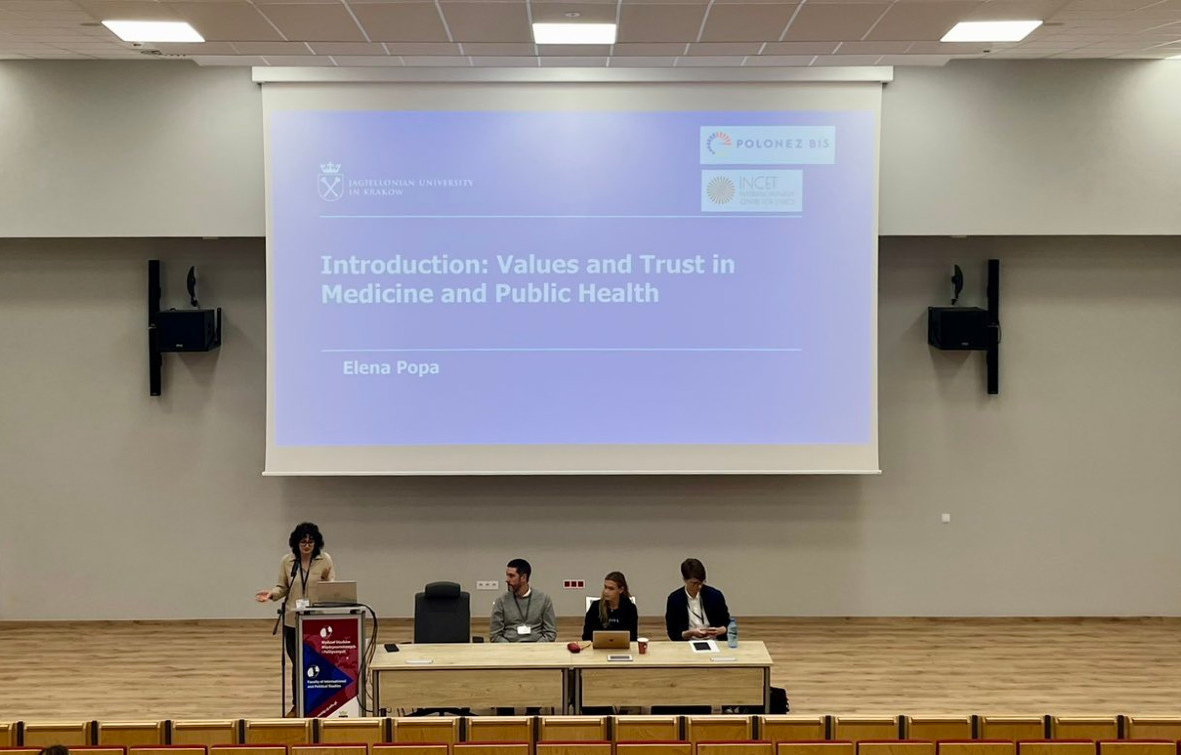Beyond Objectivity: How Justice and Equity can Rebuild Trust in Science
In an era of increasing public skepticism, is the answer simply to demand more trust in science? Philosopher of medicine Dr. Elena Popa argues for a different approach: Science must first become more trustworthy by acknowledging the central role that values like justice and equity play in its decision-making.
Dr. Elena Popa is a philosopher of science specializing in the philosophy of medicine. Her current project examines the connection between public trust in science and the ethical aspects of scientific decision-making, studying specific reference cases in public health. In her research, she draws on earlier debates of whether decisions by scientists regarding the scientific method are influenced by considerations that are not strictly scientific claims, but rather political, ethical or social ones. She argues that scientists are not immune to being influenced in this manner, prompting discussion around and going against more traditional framings of science as the pursuit of truth independent from these kinds of considerations.

Dr. Popa kayaking down the Vistula River
Through her project and research, she aims to show that values such as justice and equity are central to public health decision-making because they enable the key aspect of trust. Trust is particularly relevant to the success of public health because achieving the goals of public health requires collaboration and feedback between scientists, the public, and policy makers, all interacting with each other and influencing how we research, discuss, and follow medical interventions and recommendations. She argues against calls for increasing the public’s blind trust in science and instead advocates for dialogue around whether current practices within science are trustworthy. For trustworthy public health, concerns about justice are central because social justice is one of the most important drivers of overall health outcomes, as shown, among others, by work on population health.
So far, Dr. Popa has published three papers related to this project. Values in Public Health: An Argument from Trust is the centerpiece of the project and gives a detailed version of the argument presented above. In the same paper, she also analyzes public health interventions connected to cardiovascular disease prevention through the lens of justice requirements. She has presented her findings and research at multiple conferences around the world, such as conferences on trust in science in Dublin, philosophy of medicine in Bologna, as well as general philosophy of science in Jeju, at the Korean Society for Philosophy of Science).
Just Pluralism: Thinking about Concepts of Mental Disorder in Global Context looks at research on health justice and epistemic justice, drawing lessons in the research of choosing psychiatric beliefs and corresponding interventions while keeping in mind cultural and social variation. She has discussed ideas stemming from this paper at conferences on philosophy of psychiatry in Granada, philosophy of medicine in London, and general philosophy of science in Bergen. Her paper Loneliness as Cause uses contributions from the philosophy of causation as well as philosophical conceptualizations of loneliness to spell out the ways in which it impacts health negatively, seeking to contribute to a better understanding of these patterns for public health uses. For those interested in learning more about her work, Dr. Popa has recorded a wonderful podcast on conceptualizing loneliness as a public health problem.

Dr. Popa presenting her findings
Additionally, Dr. Popa discusses her findings in several upcoming book chapters. In ‘Challenges Facing the Physiologists and the Scientific Enterprise in a Post-truth World,’ a volume for physiologists and biomedical scientists, she explores whether social constructionist views on science lead to ‘post-truth’ politics and its negative effects on trust in science. She draws a negative conclusion, pointing instead to deeper social dynamics, some internal to science, as the culprit of warranted distrust. Thus, she concludes that restoring trust requires drawing from some of these deeper effects to highlight power structures and how they affect knowledge production and ensuring equitable access to the products of science. She ends the chapter bringing attention to this conclusion and issues recommendations for scientists working in areas of research relevant to her findings.
In another forthcoming book chapter, ‘Trustworthy Science: Lessons from Feminist Epistemology’, a volume integrating epistemology and philosophy of science, she uses insights from feminist epistemology to distinguish between notions of trust that refer mainly to reliability from those that involve moral values, such as having the right kind of motivation or making a commitment to others. These two notions are important for understanding public trust in science and yield different recommendations with regard to addressing legitimate distrust. The ideas for this book chapter took shape during a symposium in Lisbon, and Dr. Popa has presented a more in depth discussion of this topic at a conference in Hong Kong.
She hopes to publish two articles in the following months, including an investigation of institutional trustworthiness and requirements for solving disagreements between scientists in vaccine research, and a joint paper using insights from democratic theory and deliberation to address issues concerning science and public engagement, particularly how input from the public can be incorporated in decisions about values. The latter is part of a collaboration with Michał Zabdyr-Jamróz from the Institute of Public Health at the Jagiellonian University Medical College, alongside other publications through which they plan to bring together and discuss the philosophy of science and politics, ethics, and issues regarding health policy and healthcare.
Together with her mentor, Tomasz Żuradzki, she was involved in organizing two conferences in Krakow, inviting scholars working on topics related to her project like Bioethics meets Political Philosophy. This conference involved discussions on topics in public health and medicine from ethical and political perspectives, and Dr. Popa and her mentor are co-editing a special issue in the journal Diametros featuring some of the contributions from this conference. She has also helped organize the fifth biennial conference of the East European Network for Philosophy of Science, where she put together a panel with invited speakers on the topic of her project – (Dis)Trust in Public Health. She hopes to develop future ideas and collaborations from the panel discussion, as well as help spread interest in these topics around the Central-Eastern Europe region, for which she thinks the conference was a good starting point. In an effort to broaden the reach of her research, she has also run a workshop in Bucharest in collaboration with the Association of Trainee Psychiatrists from Romania providing trainee psychiatrists with a toolkit from the philosophy of medicine to reflect on their practice.